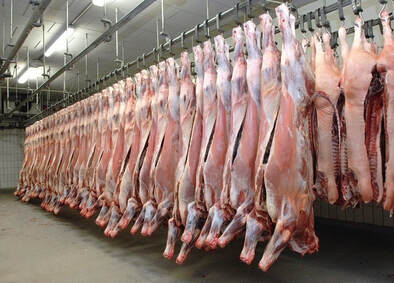
I am tempted to support such a production, and recruit a gang of agile young farmers who can slip through unlatched windows, shin up drainpipes, and pick the occasional lock or two!
As Channel 4 has maintained that ‘How to steal pigs and influence people’ complied with Ofcom’s broadcasting code, and did not condone or encourage criminal activity, then surely trespassing and stealing, albeit carried out by farmers, would also be acceptable, in the name of fairness!
Just to be on the safe side it would be wise to check in with Chief Constable Giles York, to ensure we have the Law on our side, and do not end up behind bars!
It is encouraging that DEFRA Secretary Theresa Villiers has repeated her commitment that the Government’s intention is to press ahead with the plan to cut ‘excessively long’ journeys, for livestock from farm to abattoir. However, the length of journey is not the only factor influencing farmer’s choice of abattoir. What is just as important, is whether the closest abattoir complies with the certification required for export.
As Christopher Price, chief executive of the Rare Breeds Survival Trust, told the Farmers Guardian, it was good that Government had recognised the abattoir network needed more attention.
He said: “We need significant capital investment in existing abattoirs to ensure they can cater for changing markets.” He is spot on there. If we are to expand our exports it is essential abattoir facilities are fit for purpose, and smaller independents receive the investment required to ensure farmers can supply the overseas markets wishing to purchase quality British meat. This should be a priority and must be addressed now.
It is encouraging to know that organisations representing our sector such as the National Beef Association, are working hard on our behalf to get the right messages across to Ministers and departments at DEFRA.
It is easy to forget that those on the boards of these organisations are working farmers who give their time willingly and generously because they want to make a difference. They represent fellow farmers and ensure the right information is delivered first hand.
If it were not for these dedicated individuals who are prepared to travel from their farms to endless meetings in London and elsewhere, Ministers and their ‘advisers’ would only hear from academics, environmentalists and the commercial food industry. If you want the raw truth from the coal face of food production, listen a farmer.
An interesting study has been carried out by the Woodland Trust. They sampled the leaves from three native deciduous species – willow, alder and oak – from three sites across the UK, and analysed their mineral, energy and protein content.
Willow leaves from all three locations were found to provide sheep with zinc and cobalt at concentrations exceeding the requirement in mg/g of dry matter, in some cases up to 17 times.
These elevated concentrates could actively correct deficiencies of these minerals in grass; meaning farmers could get better growth from their flock by integrating trees on their land.
At a time when farmers are being encouraged to plant trees, this useful research project is a helpful tool in providing information for livestock producers on which species of trees to plant and where.
The roots of the willow are very aggressive in seeking out moisture, and are used extensively as erosion control along water courses. All these qualities including being a food source for native butterflies, and the making of cricket bats, asks the question - what is not to like about Willows?

 RSS Feed
RSS Feed